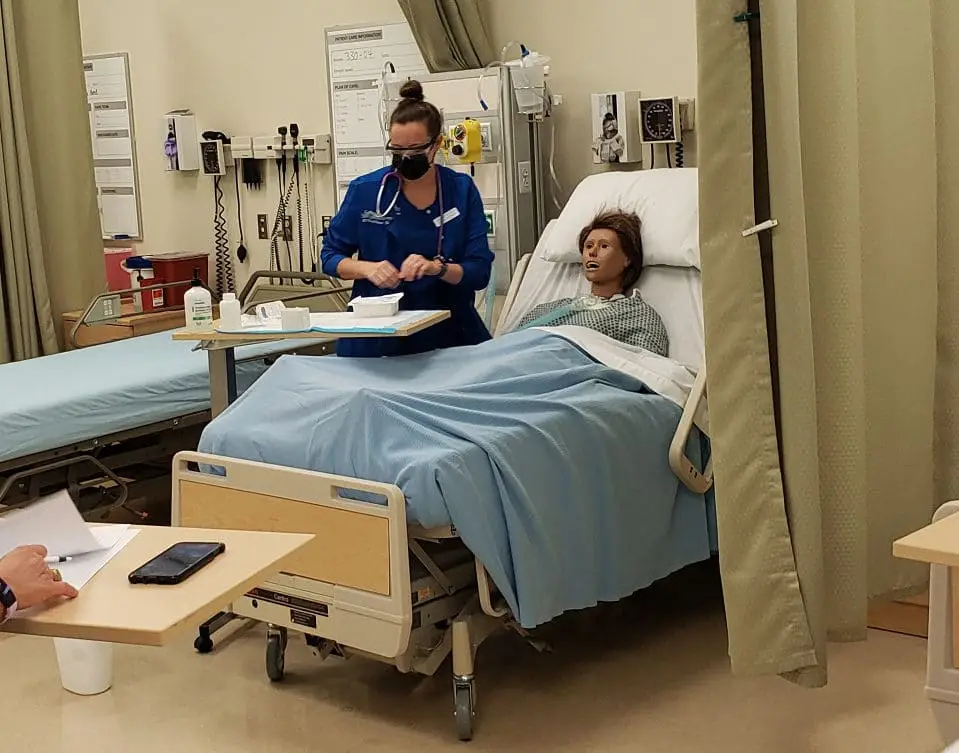The global pandemic caused the existing shortage of healthcare professionals to seem even more pronounced. However, years prior, Fayetteville State University was at work helping to fill the need for trained nurses with new equipment that helped grow the size of the program as well as provide an option for clinical hours.
In August 2018, the Golden LEAF Foundation Board of Directors awarded $134,200 to Fayetteville State University to enhance training within the School of Nursing through additional software and simulated training equipment.
The equipment was up and running right before the pandemic ended opportunities for students to get the clinical hours they needed to graduate at healthcare facilities. Thankfully, the Board of Nursing allowed creative solutions such as using simulation equipment to complete needed clinical hours.
“The timing was perfect,” said Dr. Afua Arhin, Interim Dean of the College of Health, Science, and Technology at Fayetteville State University. “Since we had to greatly reduce the number of clinical hours in healthcare settings, we had to get creative. We have never used simulation more than we have used it in the last year.”
Part of the creativity included keeping the labs open longer.
“When we started the program, we had a culture of caring, and this is what we use to drive the program,” said Dr. Arhin. “Our instructors have been working around the clock. We assigned our faculty to the labs so we weren’t overworking our lab instructors.”
The new equipment has not only helped Fayetteville State’s programs during the pandemic but has increased its capacity to help graduate more nurses.
“We were able to increase the number of students we were able to admit into the nursing program,” said Dr. Arhin. “We were approved for 90 students. When you request an expansion, you have to show that you can handle the increased number of students. The equipment we purchased with funding from Golden LEAF, along with matching funding from North Carolina Blue Cross and Blue Shield Foundation, helped the nursing program be approved for 200 students.”
In May 2021, Fayetteville State University’s nursing program had 35 nursing graduates. All 35 graduates have jobs in the field. The program expects to graduate 52 in December 2021, their largest class to date.
One of the unique aspects of Fayetteville State University’s program is that it serves a majority of nontraditional and minority students.
“We do see a difference in student outcomes without the normal face-to-face instruction and clinical experiences,” said Dr. Arhin. “We have pushed to move back to more of a normal rotation with labs, clinicals, and classroom time as much as possible.”
Dr. Arhin said with so many nontraditional and minority students, the impact is greater, when something like a pandemic occurs.
“We have so many students that when we pivoted to go online that didn’t want to go home,” said Dr. Arhin. “I called a student once who was in the car studying because there were so many people at home. It was so distracting. She could only find a place to be alone by being in her car.”
Dr. Arhin is pleased with the way the faculty showed up for the students to help them all be successful. They did not lose one student in the program.
“Our faculty have been social workers, friends, confidants, tutors, all to help the student be successful,” said Dr. Arhin. “The students are so awesome with all of the challenges and hoops they have to jump through, and they do it. We have such an impact that transcends the individual student.”
One student’s testimonial helps explain how these programs are helping break generational barriers and will provide success for generations to come.
“I want to thank you for allowing me to enter into the bachelor of science in nursing (BSN) program,” said the BSN student. “Your decision allowed me to grow in so many ways, break generational curses, and overcome barriers that at one point I felt were impossible. I have taken the NCLEX and passed. You ensured that we were well prepared, and I am so grateful.”

